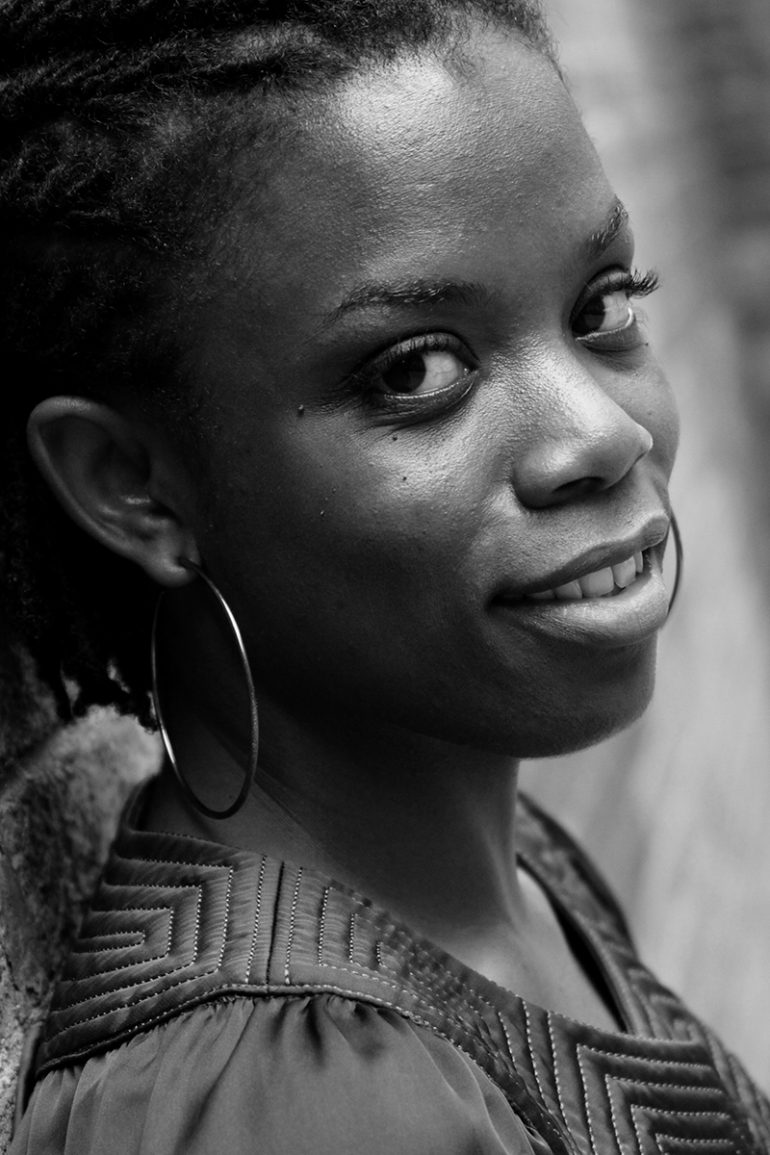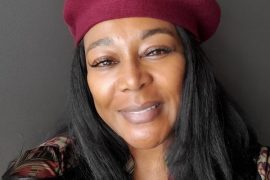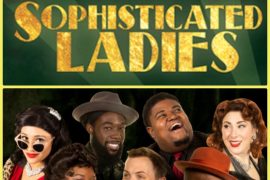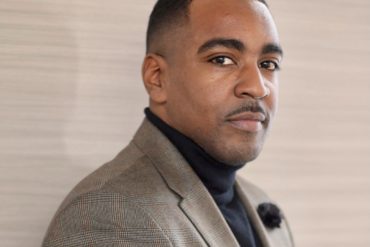Antoinette Nwandu is a New York based, award-winning playwright.
Inspired in part by the students she encountered as a community college teacher, Nwandu’s latest play, “Pass Over”, follows two young black men standing around on the corner—talking shit, killing time and hoping that maybe today will be different. When a stranger wanders into their space, an escalating crisis threatens to prevent their escape from the block. Inspired by both Waiting for Godot and the book of Exodus, “Pass Over” combines pop culture, historical and religious references into a hilarious and disturbing meditation on manhood, race, and the cycle of violence that prevents too many from realizing their full potential.
N’Digo recently caught up with Nwandu to discuss her path to becoming a playwright, her unique writing process, and of course her latest buzz-worthy play, “Pass Over“.
How did you get your start as playwright? Did you always know this is what you’d do professionally?
I backed into playwriting after a series of detours in other fields. For most of my adolescence I clung to the dream of being first a lawyer and then a doctor. I blame “The Cosby Show” because—Bill Cosby’s current sins notwithstanding—the Huxtables were pretty much the only highly educated, consistently employed, well-adjusted black people I knew growing up. When I got into college, I realized that I would be the worst doctor ever and began focusing on a career that would support my love of words. I tried to pursue academia, but grew tired of how irrelevant theory seemed to be; then I turned to journalism, but hated that the quotes I gathered never really fit the ideas I wanted to express.
A light bulb went off, though, when I landed my own column in The Crimson. It was a space of my own and it was fun! Around that time I also started reading more plays, and flirting with this completely foreign space called The Theater. Long story short, I ended up in NYC working as a critic after spending the year after college abroad. That job ended up being the last detour: my reviews were described as too soft and too focused on making the art better. I was speaking to the artists instead of the audience. So, I had to make a decision, either get mean for profit or fully identify with the group I was naturally drawn to in the first place. Happily, I decided on the latter.
Was there an “aha” moment when you knew for sure that you’d be able to make a living doing this?
No, there wasn’t. I was employed full-time as a professor until fifteen months ago, which meant the bills (sort of) got paid, but the writing happened at a much slower pace. Though I was able to save a little cash for my eventual transition from writer-with-a-day-job to full-time-writer, that move was still a leap of faith. What I mean is, the decision to write full-time has been divorced from the certainty that doing so will be financially viable. I’m motivated by necessity, not logic.
As a black woman playwright, what are some of the unique obstacles you have to deal with?
The biggest obstacle I face is the notion that when I speak, I’m representing not only myself, but all black women or all black people; that I’m some kind of translator for The Black Experience. It’s frustrating, because, first of all, the black experience isn’t a monolith and second of all, I’m one person. I encounter this most often when non-black people or institutions are confronted by something racialized, but don’t know a ton of black people who they can talk to about it. And while I want my work to create spaces for learning and change, the (often unpaid) labor of translating what I believe is weighted even further by my knowledge that my words are a first point of contact for many people. That future black people might be judged by the impressions I’ve made. That’s hard.
Another obstacle I face is the notion that I can only write “black plays” meaning plays with black people in them or plays that wrestle expressly with race. I’ll never be able to write a colorblind play the way that some white writers claim they can because I don’t own that kind of privilege. I can’t fully know who a character is while ignoring their race any more than I can fully know a character without knowing their gender or class. Race informs how characters responds to challenges, the baggage and perspectives they bring to a situation just like in real life. Writing “raceless” characters who clearly operate the way a white person with white privilege would operate in the world is lazy and insulting. So, yes, a character’s race will always be an integral part of who my characters are. What’s more I love writing about this stuff, digging into the hard questions. And I know it’s necessary work because the United States will never be able to live up to the ideals enshrined in our founding documents until we deal with race. It’s our original sin, our constant stumbling block. I do wonder, though, when I write plays that doesn’t expressly engage blackness or race, will those plays be produced? That’s a question I genuinely don’t know the answer to.
And then there are all of the everyday obstacles like learning the craft, learning to live with rejection, learning to harness the inner critic, learning to play nice with others, and learning to live on a serious budget. You know, those kinds of obstacles.
Tell us about your latest play “Pass Over” and what inspired you to write it?
“Pass Over” is a mashup of the biblical Exodus story and Waiting for Godot in a modern urban setting. It concerns two young black men wrestling with whether or not there is a promised land for black men in the United States. Inspiration for the play came from three directions, really: political, professional and professional. Politically, I wrote “Pass Over” as a response to the senseless killings of young black men that have plagued our country of late, most expressly Trayvon Martin’s death. For every step forward the black community makes—specifically young black men—there is this equal and opposite violence that resists that forward progress. And that journey, that lack of unobstructed progress seems absurdist and existential. Professionally, I was teaching at the time and could see Trayvon in many of my black and brown male students, in my brother even. One semester, two of my students became good friends with one another, but one of them found himself back in the system as it were, so their relationship ended abruptly. The anger and frustration I felt at seeing that happen and at Trayvon’s death, got me to the point where I couldn’t do anything but write this play. I was frustrated creatively at the time–that’s the personal part–but the anger that I felt ignited a passion I couldn’t ignore.
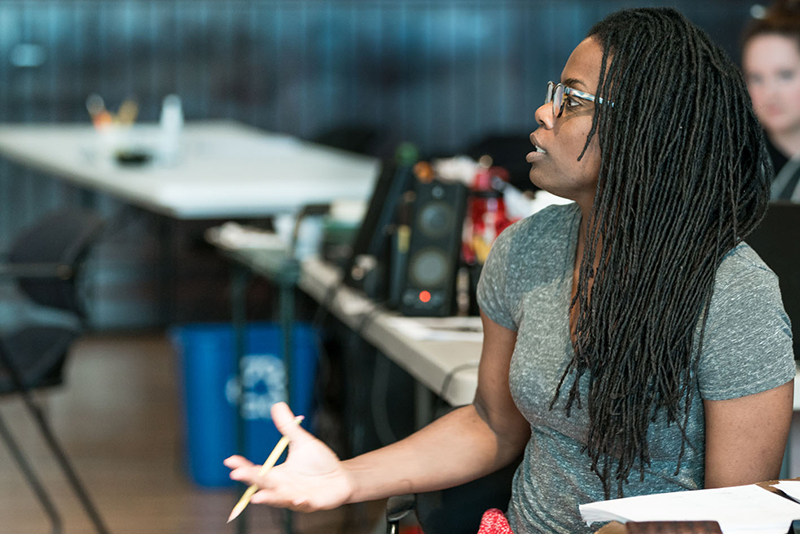
What message about young black men do you want people to take away from this piece after watching it?
I’m here to be a witness to the truth. Full stop. To be a witness to what I see happening in the world today. People are going to take away what they bring in, and I don’t know what that is. That said, I hope people don’t think the only message this play offers is about young black men. I hope people leave this play thinking about themselves.
What’s the process like of turning over your work to a director to interpret? Do you usually work closely with the director to make sure your vision is represented properly?
That moment when the text is locked and you have to trust a team of people with something that used to live only in your head is always hard. There’s a separation anxiety that I’ve just learned to make space for. It helps to work with people you trust, obviously, and to respect them and the perspectives they bring to the work. When you’re dealing with a world premiere, though, it’s absolutely crucial to be present and involved. We’re literally giving birth to the play for the first time and it’s my job to ensure my intentions are as clear as possible; also I’m relying on the creative team to help me keep the play honest . I love working closely with directors (and designers for that matter) because hearing them talk about my work in their own terms helps me learn so much about the play I’ve written.
What if anything is your writing routine?
I usually start with research, both internal and external. Internal research means writing moments that help me explore the emotional landscape of characters who are still new to me at this point. And then external research includes any fact-finding I need to do in order to fill out that world. After a while, I have a better sense of who these characters might be and start to plot out what they might do, so I start to write scenes that focus on moments of conflict. If I can figure out the shape of a conflict, understand who a character is when their feet are to the fire, I’m in a pretty good shape. Then it’s just rewriting and re-discovering until the thing is done. Hmmmm I guess that’s actually more about my process than my daily routine. My daily routine is pretty all over the place right now.
Who are three of your all-time favorite playwrights?
Samuel Beckett, Adrienne Kennedy & Shakespeare (which is kind of a cheat answer, but also true).
Best advice to aspiring playwrights?
Don’t quit your day job until you absolutely have to. Write at night and on the weekends. Save money. Or be rich. Yeah, maybe just be rich.
Any favorite affirmations or quotes you swear by?
“Strong and Wrong.” I come back to this all the time when I’m making a new play, especially because I’ve struggled with perfectionism all my life. Accepting that failure is a crucial part of the creative process was difficult for me because as a student, I often felt that being perfect was the only way I would be granted access to certain opportunities. So I shied away from experimenting with hobbies, extra curriculars and even subjects that I knew I wouldn’t be able to master right away. Once I embraced the creative process, however, I had to learn to embrace failure and the immediate lessons it teaches. That whole journey has been so freeing, actually. So empowering.
What’s next for Antoinette Nwandu?
Danya Taymor & I are developing my new play, TUVALU or The Saddest Song at Sundance in July. It’s a fairly autobiographical play about a young woman’s coming of age set against the backdrop of the OJ Simpson trial. And there’s music in it, so that’s exciting. After that I’m working on a new play that I’m not ready to talk about yet. As far as wider goals, I’d love to write for television because I think my sense of plotting and storytelling would work in that genre. I’d also love to write the book of a musical for the same reason.
Steppenwolf Theatre’s presentation of “Pass Over” runs June 1 – July 9 in the Upstairs Theatre located at 1650 N Halsted St. For more information on the play, please visit www.steppenwolf.org and for more information on Antoinette Nwandu please visit www.antoinettenwandu.com.


